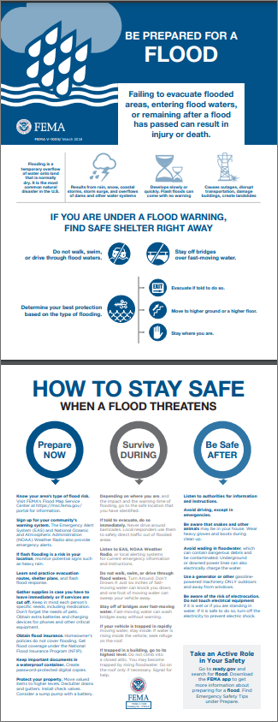5 Ways to Protect Yourself and Your Home from Flooding
Seven hurricanes struck the U.S. in 2021, marking the sixth consecutive above-normal Atlantic hurricane season, according to the National Oceanic and Atmospheric Administration. Two registered as Category 4 storms, including Hurricane Ida, which unleashed winds of up to 172 miles per hour and caused more than 90 deaths across nine states.
Hurricanes—also called typhoons or cyclones—damage millions of homes in the U.S. every year. And you may be surprised to learn that a homeowner is 27 times more likely to experience a flood than have a fire during a 30-year mortgage.
Even minor flooding from a hurricane can be costly—just one inch of floodwater in your home can cause $25,000 in damage.
To be clear, hurricanes aren’t only a coastal problem. Which is why you should take the following steps, no matter where you live, to protect your home and your personal safety from a hurricane flood.
Have an emergency plan. Make sure your family is prepared for a hurricane. A comprehensive emergency plan includes gathering emergency supplies (like food, water, and medicine) and equipment (such as flashlights and generators), as well as knowing where you’ll take shelter. To reduce your risk of bodily harm, take refuge in a storm shelter or an interior room. Move to higher ground if flooding begins to occur.
Stay on top of warning signs and alerts. It’s important to know the difference between a hurricane warning and a hurricane watch. A hurricane warning is issued when a storm with sustained winds of 74 mph or higher is expected. The warning is typically issued 36 hours before the onset of tropical-storm-force winds, giving you time to prepare. Meanwhile, a hurricane watch is issued when tropical storm conditions with winds of 39 to 73 mph appear possible within the next 48 hours.
We recommend downloading the FEMA mobile app to receive real-time alerts from the National Weather Service. You can sign up to receive warnings for up to five locations nationwide, which is helpful if you live in different cities throughout the year.
Secure your property. If you receive a hurricane warning or a hurricane watch alert, cover windows with storm shutters or plywood cut to fit. Scan your yard for anything that could become wind-borne debris, like lawn and deck furniture, bird feeders, hanging pots, planters, or gardening equipment. (Secure these items in a shed, cellar, or other area.) And unplug electrical equipment and appliances, except for freezers and refrigerators, to reduce your risk of being electrocuted.
Stay safe after a hurricane flood. A few rules of thumb to follow if your home or surrounding area floods: do not touch wet electrical equipment; wear protective clothing, including gloves, goggles and boots, during cleanup (floodwaters may contain sewage, bacteria, and chemicals that can cause illness); avoid damaged or fallen power lines, poles, and downed wires; and avoid drinking tap water until local officials say it is safe.
Product, service, program, credit, and discount availability and limits vary by state. The information provided on this site is provided for informational purposes only and is not a full explanation of products, services, or coverage. For more information, please contact Electric Insurance Company at 800.227.2757. If there are discrepancies between the information on this site and the policy, the terms in the policy apply.
Electric Insurance Company Risk Coaches help you assess your current coverages and exposure to risk based on the information you provide during your discussion. The services provided are for informational purposes only and do not create a professional or fiduciary relationship. Incomplete information or a change in your circumstances after your meeting may affect coverage requirements or recommendations.

Hurricane flooding is a threat to millions of Americans. Use this handy, downloadable PDF (376kb) from FEMA for more preparation and safety tips.


